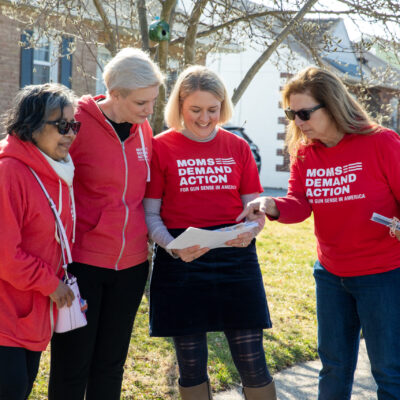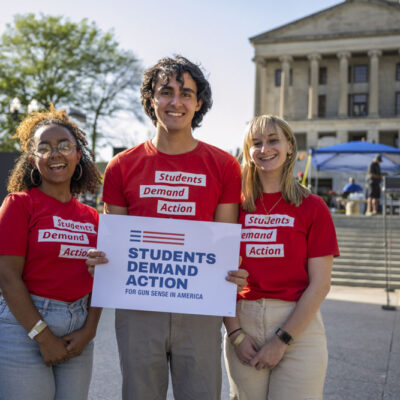Following Recent Gun Violence, Massachusetts Moms Demand Action and Students Demand Action Volunteers Urge Lawmakers to Take Action on Gun Safety as Lawmakers Return to Beacon Hill
9.5.2023
BOSTON – The Massachusetts chapters of Moms Demand Action and Students Demand Action, both part of Everytown for Gun Safety’s grassroots network, issued the following statement urging lawmakers to take action on gun safety as lawmakers return to Beacon Hill following summer recess. The past month was marked by deadly gun violence both in Massachusetts and across the nation, as the crisis continues to be the leading cause of death in the country for children, teenagers, and college-aged people. Ahead of the summer recess, legislative leaders publicly committed to passing legislation to strengthen our gun laws, including with a bill to prohibit ghost guns and keep guns out of sensitive locations.
“While lawmakers were on their summer recess, communities from Springfield to Dorchester were struck by senseless acts of gun violence,” said Deborah Wornum, a survivor of gun violence and volunteer with the Massachusetts chapter of Moms Demand Action. “The cost of inaction is too steep for our communities to bear. Our legislators have pledged to take action, and must uphold that commitment. We look forward to working with them to strengthen our gun safety laws and strive for a future free from gun violence.”
A snapshot of recent gun violence in Massachusetts:
- LYNN: On Labor Day weekend, three people were shot and killed and at least five others were wounded in Lynn during two separate shootings. In the early hours of Saturday, a person from their car shot and killed two men. While another man was shot and killed in their car, according to reports, officers said the shooting does not appear to be random.
- BOSTON: On August 26, two people were arrested after they shot and wounded at least seven people at the Caribbean Carnival Festival in Dorchester. According to police, the shooting erupted after two groups were reported to have “some type of altercation.”
- WORCESTER: On August 27, a 15- and 23-year-old were shot and wounded at the city’s Caribbean Carnival Festival. According to reports, the suspects remain at-large and no arrests have been made.
- FALL RIVER: On August 24, a 17-year-old shot and wounded a 14-year-old, in an incident where, according to local law enforcement, the shooting appears to have been unintentional.
- SPRINGFIELD: On August 18, a man forced entry into a neighbor’s apartment where he shot and killed two people, including 10-year-old Aubrianna Lynn, and shot and wounded a 12-year-old child. The family’s dog was also shot and killed by the shooter.
- BROCKTON: On August 8, a man was shot and wounded on Stillman Avenue in Brockton. According to reports, the incident happened just before 9 p.m. at an apartment complex that’s part of the Brockton Housing Authority on Stillman Avenue.
House Judiciary Chair Michael Day introduced HD.4420 – a wide-ranging piece of legislation that would ensure that people who want to carry guns in our communities receive proper training and would establish sensitive places across the Commonwealth where firearms are prohibited – a common practice in many states, including some with weaker public carry laws than Massachusetts. The bill will also help keep illegal guns from flooding our communities, keep dangerous assault weapons and glock switches out of Massachusetts, study ways to improve our funding structure for community violence intervention programs, and explore new innovative gun safety technologies such as microstamping.
In addition, HD.4420 would prohibit ghost guns in the Bay State. These untraceable firearms are do-it-yourself, homemade guns made from easy-to-get building blocks that can be purchased with no background check and no questions asked. Ghost guns are the fastest-growing gun safety problem facing our country. In less than one hour, these self-made weapons become fully functioning, untraceable firearms. A person–including children and individuals with dangerous histories who are prohibited from purchasing and possessing firearms– can buy the parts and assemble a ghost gun without even undergoing a background check.
The Washington Post recently reported on how American teenagers can, with ease, acquire the parts for ghost guns, often leading to deadly outcomes — such as the incident in the Caribbean Carnival Festival shooting in Boston, where authorities identified a ghost gun with an extended magazine capable of holding 31 rounds which led to a teenager being charged with illegal possession of a weapon. These shootings are a reminder of why ghost guns are a weapon of choice for extremists and people with dangerous histories, as they lack serial numbers, making it harder for law enforcement to identify and apprehend those who use them to commit crimes.
Ghost Guns by the Numbers:
- According to the Massachusetts Crime Gun Report, last year saw a 75% increase in seizures of ghost guns in Massachusetts in comparison to 2021.
- In April 2022, the Boston Police Department announced that ghost gun recoveries were up nearly 300% since they started tracking them in 2019.
- As of May 2020 there is at least one seller in 26 states across the country who is selling the core building blocks for a ghost gun.
- More than ⅔ of the 80 online firearms dealers identified started selling ghost gun building blocks since 2014.
- More than 2,500 ghost guns were connected to criminal activity in 114 federal cases from 2010 to April 2020.
On August 8th, the U.S Supreme Court granted the Biden Administration’s request that the Supreme Court stay the lower court’s decision to invalidate the Bureau of Alcohol, Tobacco, Firearms and Explosives’ (ATF) ghost guns rule. The rule, which was finalized in April last year and took effect last August, confirms that ghost guns are to be treated like the deadly firearms they are. ATF’s rule updated and clarified key regulatory definitions, including “firearm,” “frame,” and “receiver” to ensure that kits and components that are easily assembled into untraceable ghost guns are subject to the same regulations as firearms.
In an average year in Massachusetts, 255 people die by guns and 557 people are wounded. Gun violence costs Massachusetts $3.5 billion each year, of which $85.4 million is paid by taxpayers. More information on gun violence in Massachusetts is available here, and Everytown’s Gun Law Rankings – which shows Massachusetts’ gun laws are the strongest in the country – is available here.
To speak with a Massachusetts Moms Demand Action or Students Demand Action volunteer, please reach out to [email protected].




